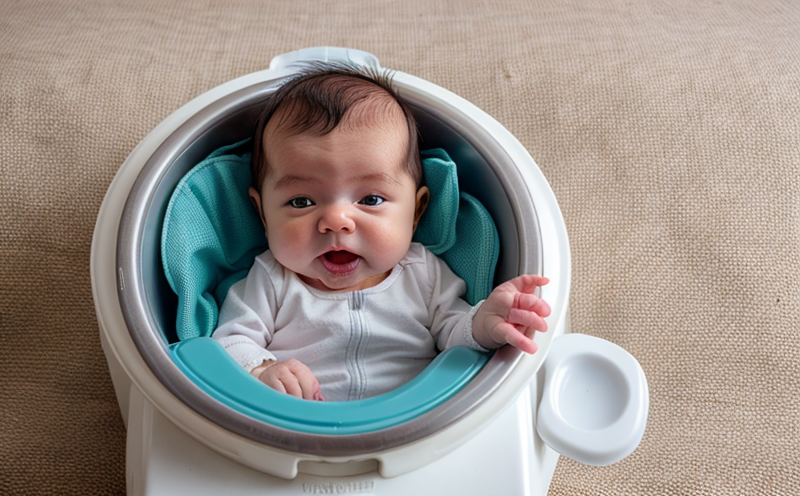ISO 71420 Sweetener Residue Detection in Baby Foods
ISO 71420: This international standard provides methods to detect and quantify the residues of sweeteners, including sucrose, lactose, fructose, glucose, and other sugars, in baby foods. The standard is crucial for ensuring that infant formula and baby food products meet regulatory requirements regarding sugar content.
The detection of sweetener residues is essential because excessive sugar intake can have adverse effects on the health and development of infants. Sweeteners are often added to enhance flavor or improve palatability, but overconsumption can lead to various issues such as tooth decay, digestive problems, and weight gain. By adhering to ISO 71420 standards, manufacturers ensure that their products do not exceed recommended sugar limits.
The testing procedure outlined in ISO 71420 involves several steps:
- Sample Preparation: The baby food sample is prepared according to the specified method. This may involve homogenization and dilution if necessary, ensuring that the sample is representative of the product.
- Solution Analysis: The sample solution is analyzed using high-performance liquid chromatography (HPLC) or gas chromatography-mass spectrometry (GC-MS). These techniques are sensitive enough to detect even trace amounts of sweeteners.
- Data Interpretation: The results from the analysis are interpreted according to ISO 71420 guidelines. This involves comparing the measured values against the acceptable limits set by regulatory bodies such as the European Food Safety Authority (EFSA).
The implementation of this test is not only about compliance with regulations but also about safeguarding public health and ensuring product quality. By adhering to these standards, manufacturers can provide safe and nutritious products that meet consumer expectations.
Why Choose This Test
Selecting ISO 71420 sweetener residue detection for baby foods is critical because it ensures the safety of infants by preventing excessive sugar intake. Here are several reasons why this test is essential:
- Regulatory Compliance: Adhering to international standards like ISO 71420 helps manufacturers comply with local and international regulations, avoiding potential legal issues.
- Patient Safety: Detecting and controlling sweetener residues ensures that the nutritional balance of baby foods is maintained, which is crucial for infant health.
- Consumer Trust: Consumers trust brands that adhere to strict quality control measures. ISO 71420 testing builds this trust by demonstrating a commitment to product safety and quality.
In addition to these benefits, the test also supports ongoing research in pediatric nutrition and helps manufacturers innovate safer products. By staying ahead of regulatory changes and industry trends, companies can ensure they are meeting current standards while preparing for future requirements.
Customer Impact and Satisfaction
The impact of ISO 71420 sweetener residue detection extends beyond compliance to the direct benefit of customers. By ensuring that baby foods meet stringent safety standards, we enhance customer satisfaction through:
- Increased Safety: Parents can rest assured that their children are consuming safe products free from excessive sugar.
- Predictable Results: Consistent results across different batches and manufacturers provide a reliable purchasing experience for parents.
- Peace of Mind: The knowledge that rigorous testing is being conducted instills confidence in the product.
Sustaining these benefits not only improves customer satisfaction but also fosters brand loyalty. Parents are more likely to choose and recommend brands that prioritize safety and quality, which translates into long-term business growth for manufacturers.
Environmental and Sustainability Contributions
In addition to enhancing product safety and customer satisfaction, ISO 71420 sweetener residue detection contributes positively to environmental sustainability. By ensuring that products meet strict sugar content limits, we help reduce the environmental footprint associated with high-sugar diets:
- Reduction in Waste: Lower sugar intake can lead to less frequent consumption of sugary snacks and drinks, potentially reducing waste.
- Healthier Lifestyle: Promoting a healthier lifestyle for infants can have cascading effects on their overall well-being as they grow into adulthood, encouraging more sustainable dietary habits throughout life.
The use of this test also supports broader sustainability goals by encouraging manufacturers to innovate and develop safer products. This innovation can lead to the development of new formulations that are both safe for infants and environmentally friendly. By focusing on these aspects, we contribute to a healthier planet while providing safer products.





